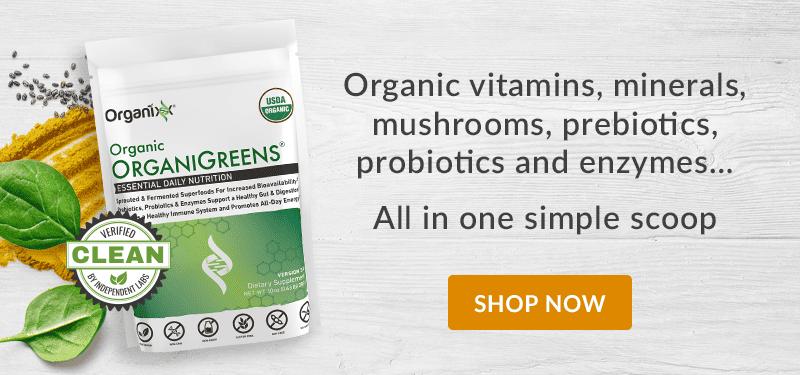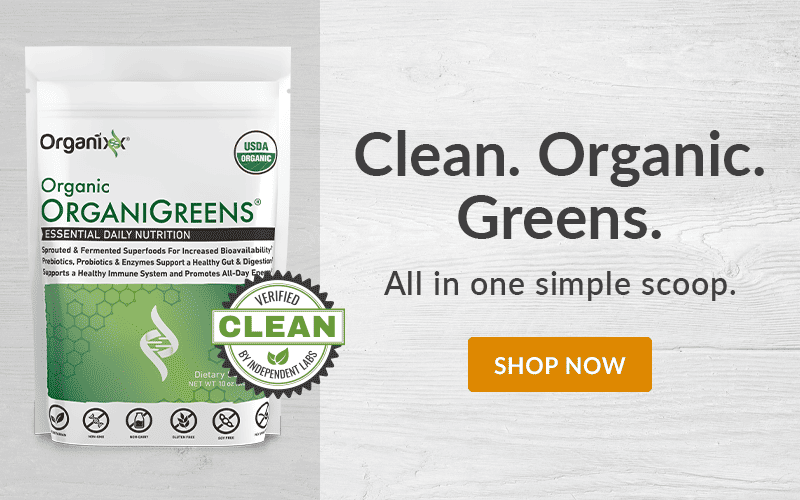When you think of alfalfa, you may imagine sleepy cows chewing their cud out in the pasture. But did you know that this green grass we so often think of as “hay” is actually a powerful superfood? In fact, alfalfa has been used medicinally for people for longer than it’s been used in agriculture! Here’s the lowdown on alfalfa health benefits and the amazing phytonutrients available within each blade of grass or sprout.
Alfalfa’s Healing Properties Have Been Known for Thousands of Years
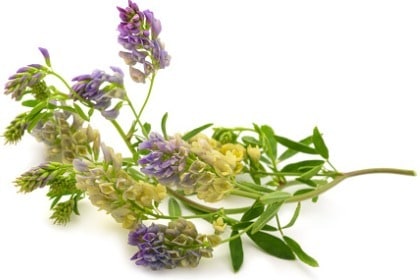
Alfalfa (Latin name Medicago sativa) is also commonly known as lucerne, particularly in Europe. Long before agriculture came to be the norm the world over, this plant – which is technically a legume – was used by ancient cultures as a powerful herbal medicine.
It originally hailed from South and Central Asia. Many centuries ago, however, it made its way to other continents and now is grown all over the world as a staple feed for horses, cattle, and other livestock.
As a source of human nutrition, alfalfa has been grown and eaten in the form of sprouts for decades. It can also be juiced, dried, and taken as a tea or in supplement form.
So, why would someone want to consume plain ordinary “hay” for their health? Read on to discover much more about the impressive alfalfa benefits for people and animals!
Benefits of Taking Alfalfa: Essential Vitamins & Minerals
Alfalfa is high in vitamin K and contains a number of B vitamins as well as vitamin C. It also contains an equal amount of many vital minerals needed for organ repair, bone development, brain health, and more.
Here is just a sampling of the dozens of essential vitamins and minerals found in 1 cup of alfalfa sprouts as well as their RDAs [1]:
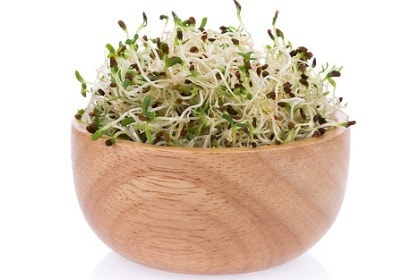
- Vitamin K, 13%
- Vitamin C, 5%
- Vitamin B2 (Riboflavin), 2%
- Vitamin B1 (Thiamin), 2%
- Vitamin B3 (Niacin), 1%
- Vitamin A, 1%
- Folate, 3%
- B5 (Pantothenic Acid), 2%
- Zinc, 3%
- Copper, 3%
- Manganese, 2%
- Iron, 2%
- Magnesium, 2%
- Calcium, 1%
- Potassium, 1%
Alfalfa also contains a solid amount of choline, betaine, sodium, and selenium.
Alfalfa Is a Major Source of Vitamin K
Of particular note is how much vitamin K can be found in alfalfa. Vitamin K is essential for healthy blood and helps to regulate clotting during injury. It is also a key helper for the absorption of both calcium and vitamin D. People with vitamin K deficiency often develop bone density issues such as osteoporosis and are also more susceptible to heart disease [2].
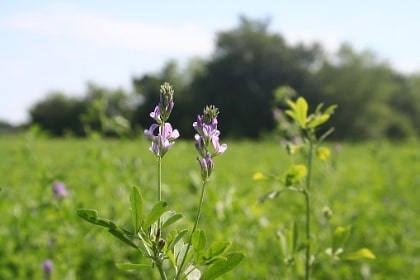
Interestingly, farmers have known about the vitamin K-blood health-alfalfa connection since at least the mid-1930s. A common practice for chickens, pigs, and goats who demonstrate blood or bleeding problems has been to feed them increased quantities of alfalfa hay.
A 1935 Danish study even found that chicken flocks dying of systematic hemorrhaging were saved when fed alfalfa. The key mechanism for the turnaround was the “koagulations vitamin,” or vitamin K, found in the new feed, according to a report published in the Journal of the American Medical Association [3].
Alfalfa Is Super-Charged With Phytonutrients to Lower Cholesterol
In addition to the basic yet vitally essential vitamins & minerals in alfalfa, it has also proven to be such a healer throughout the years because of the dozens of phytonutrients contained within it.
Saponins, phytoestrogens, coumarins, amino acids, digestive enzymes, and terpenes… there are literally hundreds of phytonutrients to be found in alfalfa.
Some of the most versatile and important of the phytonutrients found in alfalfa are saponins. “Sapo” means “soap” because saponins will foam up when they come in contact with water. Saponins are mild plant steroids that have been known to [4]:

Research has identified at least two dozen different kinds of these metabolism-boosting phytonutrients in Medicago sativa [5]. In particular, investigations both in the lab and on actual patients have found that saponins in alfalfa can have a significant impact on cholesterol levels [6].
These studies on humans go back over 25 years. One survey conducted in 1987 found that when individuals with high cholesterol levels ate 40 grams of alfalfa 3 times a day, their LDL cholesterol level (usually referred to as the “bad” cholesterol) was lowered by 17% after just 8 weeks [7].vii
Alfalfa is able to regulate cholesterol absorption in the gut. It also contains major antioxidants that support the detoxification organs. These are two key reasons for its success in helping to lower cholesterol by such a significant amount.
Alfalfa Health Benefits for Reproductive Health
Interestingly, alfalfa also contains key phytonutrients called phytoestrogens which may be of benefit to some women, especially during menopause.

A small yet impressive Italian study found that a mixture of sage and alfalfa extract given to women going through menopause led to the complete elimination of hot flashes and night sweats in 65% of the study participants. All of the other women experienced at least some reduction in these disruptive symptoms.
Contrary to popular belief, most women do not need to be afraid of consuming whole foods that contain phytoestrogens. This is because these plant substances mimic the milder forms of estrogen that actually work to protect the delicate balance of hormones in a woman’s body.
Phytoestrogens like the ones found in alfalfa also help to keep xenoestrogens at bay. Xenoestrogens come from environmental pollutants, pesticides, and other chemicals and will mimic the aggressive form of estrogen called estradiol that the body produces naturally. Xenoestrogen build-up is considered by many as the number one cause of many reproductive system cancers, such as breast cancer, in women today [8].
If you’re concerned about your estrogen levels and what whole foods, including alfalfa, may be of benefit to you, be sure to consult your natural health practitioner.
You Don’t Have to Eat a Lot to Reap Alfalfa Benefits
Of course, help for the metabolism and the hormones are only two of the advantages of adding alfalfa to your diet in some way. Other ways consuming alfalfa can help you is through [9]:
- supporting your immune system
- balancing insulin levels
- supporting the pancreas
- acting as a diuretic
- helping to dissolve kidney stones
- providing relief for arthritis
- increasing milk production in lactating women
What’s more, is that you don’t need to graze in a field or consume copious amounts of sprouts to take advantage of alfalfa’s health benefits.
Organic alfalfa powder is an ingredient in Organixx USDA Certified Organic OrganiGreens all-in-one daily superfoods supplement powder, made with 17 superfoods and botanicals, many sprouted or fermented to multiply and magnify their nutritional value, plus probiotics and enzymes for maximum absorption.
Just one scoop daily of Organixx OrganiGreens mixed into water, juice, a smoothie, or other recipe provides up to 6 times as much nutrition as other green drinks (and is so much easier than juicing!).
The latest formula of Organic OrganiGreens is our best yet. In just one simple scoop, add 17 sprouted and fermented superfoods and botanicals, plus probiotics and enzymes, to your daily diet to fill nutritional gaps and support healthy immune function, increased energy and mental clarity, as well as digestion and detoxification processes. Easily mixes in water, smoothies, juices, and recipes, and it also tastes great – even without any added sugars.
